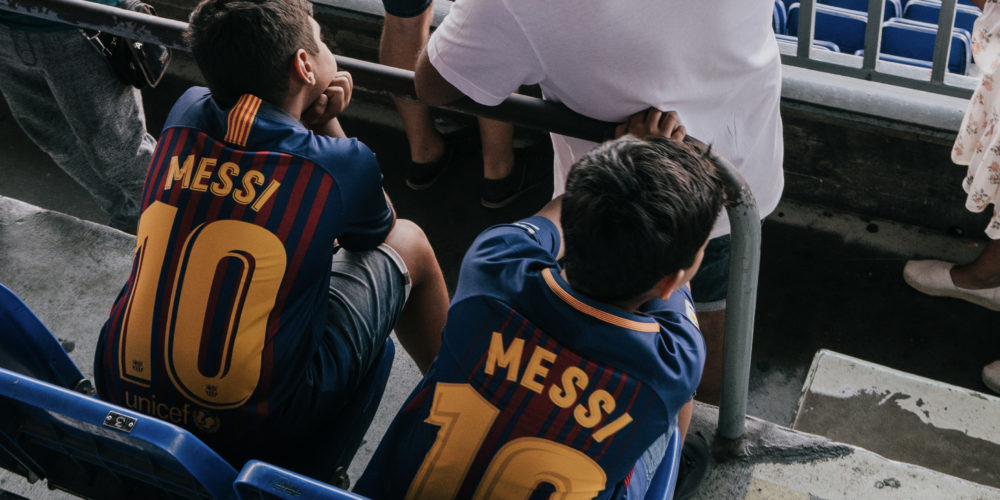Why I was unmoved by Messi’s tears

Lionel Messi cried. A lot.
Football’s leading icon showed up at a press conference to announce his sudden departure from his beloved club, FC Barcelona, after two glorious decades there. As he stood to make his speech he faltered, his voice breaking. Then came the flood of tears. After recovering, he went on to say he had never wanted his tenure with his boyhood club to end in this way, and it was only contractual and regulatory difficulties that had caused the departure. He received standing ovations from his fellow players and many in the gathering.
I was unmoved.
Don’t get me wrong. Lionel Messi is unarguably one of the two or three greatest football magicians of all time. He is a joy and a pleasure to watch. It has been a privilege to be around to see him play through all his glory years.
But boo-hoo-hoo for the club? Give it a break.
Forty-eight hours later Messi was full of smiles holding up a Paris Saint-Germain shirt and saying it was an honour to be joining the French team. He will likely earn millions of euros every month. He’s a top, top player, and can command that sort of pay. Fair enough. But crying for Barcelona? Then a short while later you are signing for a top European competitor? Well…
As Simon Kuper pointed out in The Times of London, at Barcelona Messi was paid as much as entire top-class teams might earn. His regular pay-hikes had a knock-on effect at the club, with every team-mate lining up to ask for commensurate increases. Having the great player in the team was a massive boost for the club back in the day; but of late, it was one of the causes of a financial meltdown. Messi became bigger than any player; bigger than any recent coach; bigger even than the club’s board. Barcelona was Messi. And now there is no Messi.
Both the player and the club were quick to blame the sudden departure on La Liga. But, guys, did the league regulator force you to pay crazy wages for more than a decade? Did it send you into unsustainable debt? Were your lawyers and advisors blissfully unaware of the league’s financial regulations? Was wilful mismanagement imposed on you?
And if Messi’s love for his boyhood club ran so deep, would he have held it to ransom in this way? Would he not have paused to take stock of his next steps in football? Instead, he was immediately off to one of the two or three clubs in the world able to meet his demands. And he probably had the ticket to Paris in his pocket as he cried for Barcelona.
To be honest, I struggle to keep a straight face when very rich people express any emotion that’s unrelated to their wealth. They have, after all, mostly become that rich because of a single-minded obsession with money and reward. The pay-deals top players command are not just a side-effect of being good at football; they come from relentless negotiation and renegotiation, driven by agents and entourages.
It is the same when the billionaires who own and run giant corporations talk about doing what they do for the greater good. If you believe them, those folks care deeply about the world’s problems and are really driven by the higher purposes of eradicating poverty, transforming livelihoods, easing burdens, etc. But ask any of them to continue with those noble purposes for less pay and you will hear…crickets.
What next for Barça? The club has just lost its most effective and most valuable player for no compensation; it is deeply in hock; and has an unmanageable wage bill even with Messi gone. It will need a complete overhaul. That is the final legacy of the Messi era. One senior club official reportedly told Kuper: “After Messi you see the desert, you see darkness.”
This was once one of the world’s richest clubs. Where has all its wealth gone? Into the pockets of agents, players, officials, advisors and bankers. That’s the modern way. A feeding frenzy for a few oversized egos, while the football, the fans and the future all fall by the wayside.
The key lesson from this saga: letting a handful of individuals take obscene prominence in your organization, institution or nation, no matter how talented those individuals might be, is fraught with risk. You will only buy a few years of short-lived glory that way – a feast for some, followed by famine for all. If you want sustained success, focus on team and collective, and on shared reward.
(Sunday Nation, 22 August 2021)

Buy Sunny Bindra's new book
The X in CX
here »
Popular Posts
- You are who you hang out withSeptember 28, 2025
- Born knowing the waySeptember 21, 2025
- The cost of pretenceSeptember 7, 2025
- The art of the CX rescueSeptember 14, 2025
- Bruise, mend, continueAugust 31, 2025















